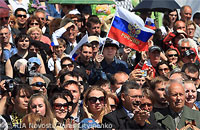Russia Reverses Birth Decline – but for How Long?

(Moscow Times – themoscowtimes.com – Ivan Nechepurenko – June 23, 2014)
When Russia annexed Crimea in March, it added 2.4 million people to the country’s population of 143.7 million, prompting several Western observers to put forward the theory that the Kremlin’s aim was to offset the effect of the country’s long-declining population.
Yet last year, long before the events in Crimea, Russia recorded its first year of natural population growth since the Soviet Union collapsed in 1991, with the number of births exceeding the number of deaths by 24,013. The trend continued through the beginning of this year, according to data released by the State Statistics Service at the end of May.
The government was quick to recognize and capitalize on the reversal of the negative demographic trends of the past two decades, though demographers are divided over whether the positive trend is sustainable.
“We have reached a qualitatively new level of many living standards, for example average income. These demographic and social development changes were achieved in a very short period, while for many other countries it took decades,” President Vladimir Putin told an audience of government officials and senior business executives at the St. Petersburg Economic Forum in late May.
All major negative demographic trends – including alcohol poisoning deaths, murder and suicide – have been receding in Russia in the last five years, with life expectancy reaching an all-time high of 71 years in 2013, according to the Health Ministry, up from 67 in 2007. Russia’s birth rate of 1.7 children per woman surpassed the European Union’s average of 1.6 in 2012.
But despite the current positive trend, it is far from stable, with two major schools of demographic thought in Russia disagreeing on whether the government will be able to contribute to its further improvement.
Anatoly Vishnevsky, director of the Demography Institute at the Higher School of Economics, warned that Russia’s recent population growth is not sustainable, as the next few generations of potential mothers will be those born after the collapse of the Soviet Union, when fewer children were already being born.
“In 2019 there will only be 12.9 million women of the most active maternity age of between 20 to 35, while in 2013 there were 17.2 million, so of course there will be fewer children in the future,” he said in emailed comments.
Russia’s economy collapsed after the breakup of the Soviet Union, which had a devastating effect on the birth rate as families struggled to make ends meet.
But the government could offset the decrease in the number of women of child-bearing age by introducing more measures to encourage them to have children, said Andrei Korotayev, chief researcher at the Laboratory of Political Demography at the Presidential Academy of National Economy and Public Administration.
“The birth rate in Russia began to grow after the government introduced financial incentives for mothers in 2007,” he said in a telephone interview.
“This was an unequivocal success, but in order to face new challenges in the future, we will have to introduce even more effective measures,” he said.
Russian families are entitled to a certificate for 429,408 rubles ($12,500) after the birth or adoption of a second child. The money can be put toward buying real estate or toward the child’s education, or be deposited into the mother’s pension account. The Finance Ministry considered scrapping the incentives in 2013, but backed off after widespread opposition among experts and the general public.
Russia has more reasons to be concerned about its birth rate in the future, as life expectancy is growing, putting increased pressure on the pension system. The mortality rate has dropped rapidly in the last few years, mainly due to new legislation restricting the sale and advertisement of alcohol in 2006, demographers interviewed by The Moscow Times said. The general growth of the economy and subsequent rise in prosperity has also contributed to increased longevity, they said.
“Russia will have to raise its retirement age soon: The current ages of 55 for women and 60 for men are already too generous for the country,” Korotayev said.
While Russians are drinking less and having more children, the country should not become complacent and be fooled into thinking that its demographic crisis is over, according to Korotayev.
“The danger is that we will get used to the present situation as the new norm, and forget how much effort it took to improve the matter,” he said.
[featured image is file photo of crowd in Russia, not directly related to article subject matter]
